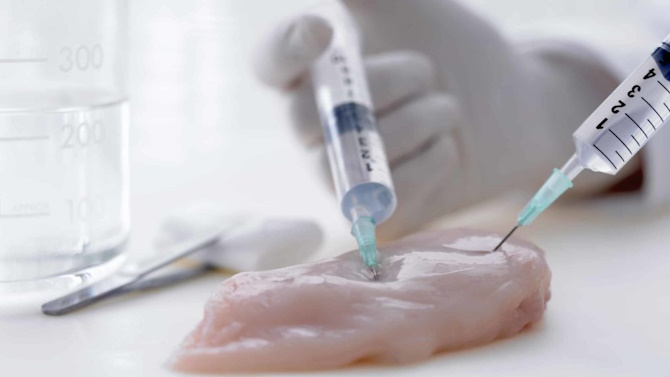Halal Food Testing
As the market for Halal foods continues to grow in the United States and Europe, more and more food manufacturers and ingredient suppliers are looking to obtain Halal Certification.
Increasing supply chain complexity, however, has made it more and more challenging to properly segregate materials and prevent accidental contamination.
We are able to test products for Halal compliance by using PCR (Polymerase Chain Reaction) DNA testing methodology to test for the presence of contaminating haram ingredients such as pork in meat and other food and feed products.
Request a quote

Animal Species Identification
We offer animal species DNA testing for foods and feed products such as meat, frozen ready-to-eat meals, animal feed, bone meal, fishmeal, fish oil, flavors, gelatin, pet food, porcine meal, poultry fat, spray-dried animal plasma, and more.
These tests help customers comply with current European Union, Japanese, US, and other country regulations prohibiting animal products in feed.
Wide range of Animal Species Testing Options:
- Ruminant-specific
- Bovine (beef)
- Ovine (mutton)
- Porcine (pork)
- Horse
- Duck / Goose
- Chicken / Turkey
- And also: Bison, Goat, Rabbit, Salmon, Dog, Cat…
Ruminant-Specific Testing
FoodChain ID Testing’s ruminant-specific test selectively detects members of the ruminant family by targeting a genetic sequence that is found only in this family, which includes cows, sheep, goats, deer and elk.
We test food and feed products such as meat, frozen ready-to-eat meals, animal feed, bone meal, fishmeal, fish oil, flavors, gelatin, pet food, spray-dried animal plasma, and more.
Our ruminant specific PCR test captures all species within the ruminant family and can help companies comply with current international regulations prohibiting animal products in feed.
Request a quote

Testing for Export Markets
Sourcing or selling food ingredients and products is now a global business reliant on regulatory law that is often complex. It’s important to possess a thorough, up-to-date understanding of a destination market’s regulatory policy in order to streamline the process and maximize market access. Working with our international network of testing laboratories, and offering nearly 20 years of experience working with international GMO regulations, FoodChain ID Testing can ensure that your testing protocol is relevant and cost-effective.
We provide accredited testing solutions to export to:
We are a worldwide accredited testing laboratory
We know testing protocols appropriate for each target market
We are a USDA-APHIS Approved Laboratory
China currently prohibits import of ruminant-containing processed animal products that can be used as pet food or animal feed ingredients. Processed animal products include poultry meal, rendered poultry fat, porcine meal, lard, spray-dried porcine blood products, and porcine protein concentrate.
FoodChain ID Testing is a USDA-APHIS approved laboratory for ruminant testing of processed animal products for export to China.
PCR (Polymerase Chain Reaction) DNA testing methodology
FoodChain ID Testing, with over 15 years of experience in food integrity testing, is able to test products for Halal compliance by using PCR (Polymerase Chain Reaction) DNA testing methodology to test for the presence of contaminating haram ingredients such as pork in meat and other food and feed products.
Qualitative results and limits of detection
Assays are performed by Real Time PCR using TaqMan® probe based technology. Results are reported qualitatively “species detected” or “species not detected.”
The limit of detection of the tests varies depending on:
– the composition of the sample
– the nature of the animal-derived material (i.e. tissue meal versus bone meal, versus blood meal, versus fresh tissue)
– the manner in which the animal-derived material has been processed(for instance, animal feed ingredients are often heated to high temperatures).
GMO Testing for Export to the European Union
The EU was one of the first regions to regulate the labeling of food consisting of or manufactured from GMOs, starting in the 1990s. The EU policy is based on the principle of process-based labeling. In this case, product labeling is required if GM crops or ingredients were used in the product’s manufacture, whether or not the final food product contains detectable GM material. For example, highly processed oils derived from GM soy, corn, or canola are required to be labeled, even if GM material cannot be detected in the processed product.
The EU has an allowable threshold for GMO content, with some restrictions, above which food products must be labeled. If your company is exporting to the European Union, FoodChain ID Testing Technical Advisors offer a free consultation to assist in determining which testing plan is most appropriate for your ingredient or product.
We are a Foreign Testing Laboratory for South Korea
FoodChain ID Testing has been designated as a Foreign Testing Laboratory for GMO testing of food products exported from the United States to Korea by the South Korean Ministry of Food and Drug Safety (MFDS). This designation allows a FoodChain ID Testing certificate of analysis to be substituted for GMO testing inspection at the Korean border for agricultural products, processed foods, health functional foods, and food additives.
FoodChain ID Testing’s status as a Foreign Testing Laboratory expedites the inspection process for food products at the destination port. When food products are imported into Korea, the laboratory test certificate issued by a Foreign Testing Laboratory can be presented at the time of import declaration. In this case, an importer can be exempted from additional laboratory testing in Korea.
Click here to view the official certificate.
GMO Testing for Export to Turkey
The realities of food import and export have required that food producers adapt to numerous regulatory environments. The complexities of different regulations associated with GMOs can put product shipments at risk of rejection or recall, a very expensive proposition for any food supplier.
Turkey recently implemented regulations regarding Genetically Modified Organism (GMO) content in certain imported commodities. According to this Regulation, certain imported food or feed ingredients containing one or more GMO at a level >0.9% are considered GMO products and must be labeled as such.
Our Technical Advisors have a wealth of experience in designing cost-effective testing plans that meet Turkey’s import requirements.
USDA-APHIS-approved laboratory for China
China currently prohibits import of ruminant-containing processed animal products that can be used as pet food or animal feed ingredients. Processed animal products include poultry meal, rendered poultry fat, porcine meal, lard, spray-dried porcine blood products, and porcine protein concentrate. FoodChain ID Testing is a USDA-AHPHIS-approved laboratory for ruminant testing of processed animal products for export to China.
Click here to see the list USDA approved laboratories.
USDC recognized laboratory for China
Beginning January 2012, China has required additional testing for imported fish meal to verify the absence of microbial pathogens such as Salmonella and Enterobactericeae. FoodChain ID Testing is recognized by the United States Department of Commerce to perform such testing. Therefore, laboratory results from FoodChain ID Testing can be used by the National Seafood Inspection Laboratory NOAA Seafood Inspection Program to determine compliance with requirements of the People’s Republic of China for fish meal exported from the USA.
